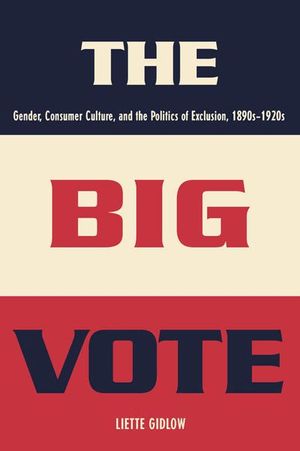The Big Vote
Published by Johns Hopkins University Press
This cultural history of voter turnout campaigns in early 20th century America sheds light on the problems that persist in democratic participation today.
In the 1920s, America experienced low voter turnout at a level not seen in nearly a century. Reformers responded by launching massive campaigns to "Get Out the Vote.” Yet while these campaigns advocated civic participation, they also promoted an exclusionary message that transformed America’s political culture. By the late 1920s, "civic" would be practically synonymous with "middle class" and "white."
At the time, weakened political parties, ascendant consumer culture, labor unrest, Jim Crow, widespread anti-immigration sentiment, and the new woman suffrage all raised serious questions about the meaning of good citizenship. Through techniques ranging from civic education to modern advertising, middle-class and elite whites worked in the realm of culture to undo the equality that constitutional amendments had seemed to achieve.
Richly documented with primary sources from political parties and civic groups, popular and ethnic periodicals, and electoral returns, The Big Vote examines the national Get-Out-the-Vote campaigns as well as the internal dynamics of specific campaigns in New York City, Grand Rapids, Michigan, and Birmingham, Alabama.
In the 1920s, America experienced low voter turnout at a level not seen in nearly a century. Reformers responded by launching massive campaigns to "Get Out the Vote.” Yet while these campaigns advocated civic participation, they also promoted an exclusionary message that transformed America’s political culture. By the late 1920s, "civic" would be practically synonymous with "middle class" and "white."
At the time, weakened political parties, ascendant consumer culture, labor unrest, Jim Crow, widespread anti-immigration sentiment, and the new woman suffrage all raised serious questions about the meaning of good citizenship. Through techniques ranging from civic education to modern advertising, middle-class and elite whites worked in the realm of culture to undo the equality that constitutional amendments had seemed to achieve.
Richly documented with primary sources from political parties and civic groups, popular and ethnic periodicals, and electoral returns, The Big Vote examines the national Get-Out-the-Vote campaigns as well as the internal dynamics of specific campaigns in New York City, Grand Rapids, Michigan, and Birmingham, Alabama.
BUY NOW FROM
COMMUNITY REVIEWS

